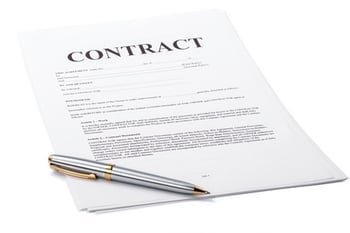
Invoice factoring, also known as accounts receivable financing, improves cash flow by selling your company's outstanding invoices to a factoring company for a fee. As with any financial strategy, it's crucial to understand these risks and weigh them against the potential benefits. Invoice factoring can be a powerful tool for improving cash flow, but it needs to be used wisely as part of a well-considered overall financial strategy.
In this article, we review and answer the following questions:
(Each links to your question/answer of interest.)
- Factors to consider when deciding whether to use invoice factoring?
- What are the risks when using invoice factoring?
- What is the average cost of invoice factoring?
- What types of businesses use invoice factoring?
- When should a company use factoring?
- Do factoring companies check credit?
- How do you get your company approved for factoring?
- Why is factoring so expensive?
- How do I get out of a factoring company agreement?
- Do you need a CFO to get invoice factoring?
What is the difference between factoring and invoice factoring? "Factoring" and "invoice factoring" are often used interchangeably, referring to the same financial process. Both terms describe a financial transaction where a business sells its accounts receivable (invoices) to a third-party company, known as a factor, at a discount in exchange for immediate cash.
This allows businesses to improve their immediate cash flow without waiting for their customers to pay their invoices. The factoring company then takes on the responsibility of collecting customer payments.
In some contexts, the term "factoring" might be used more broadly to refer to the sale of various types of assets or receivables, but in most cases and especially in a business context, "factoring" and "invoice factoring" mean the same thing.
Factors to consider when deciding whether to use invoice factoring:
- Cash flow needs: If your business has immediate cash flow needs, invoice factoring can provide a quick solution, allowing you to get funds without waiting for customers to pay their invoices.
- Customer payment habits: If your customers often delay or have extended payment terms, invoice factoring can help you obtain the cash more quickly.
- Costs: Invoice factoring is not free, and the fees can add up. The factoring company will charge a fee percentage of the invoice value. It would help to compare this cost with other financing options to ensure it's competitive.
- Control over customer relationships: Some business owners are uncomfortable with the fact that a factoring company will be collecting payments from their customers. This could potentially affect the relationship between the business with its customers.
- Qualification for other forms of credit: If your business has difficulty qualifying for traditional forms of credit (like bank loans), invoice factoring can be an attractive alternative since approval is typically based on your customers' creditworthiness, not yours.
- Nature of your business: Invoice factoring is common in industries like manufacturing, wholesale, transportation, and services, where businesses have a lot of B2B invoices. This could be a viable option if your business falls under these categories.
- Administration: Factoring companies can also take over the responsibility of chasing and collecting the debt, which may save your company time and resources.
When considering these factors, we recommend consulting with a financial advisor at CFO Selections. Additionally, you will want to shop around and compare the terms of different factoring companies to ensure you get the best deal. While invoice factoring can improve cash flow, it is not a strategy for improving profitability or addressing fundamental financial problems within the business. A CFO will offer solutions to address any underlying business issues. This is an important consideration for those who are considering this as a financing alternative.
Get access to our free cash flow calculator instantly!
What are the risks when using invoice factoring?
 While invoice factoring can be an effective way to improve cash flow, it's essential to be aware of its potential drawbacks and risks:
While invoice factoring can be an effective way to improve cash flow, it's essential to be aware of its potential drawbacks and risks:
Cost: Factoring companies charge fees, and these can be significant. Factoring can become an expensive form of financing compared to traditional loans or lines of credit. Over time, these fees can erode your company's profit margins.
Customer relationships: As mentioned before, when you engage a factoring company, they typically take over-invoicing and collection processes. They will deal directly with your customers, which could impact customer relationships. If the factoring company uses aggressive collection tactics, it may harm your reputation.
Dependence: Over-reliance on invoice factoring can lead to a cycle where you become dependent on the cash advance to fund ongoing operations. This can mask underlying issues such as profitability or sales problems. This dependence on factoring can perpetuate a cycle that's hard to break and ultimately unsustainable.
Contractual commitments: Some factoring companies require long-term contracts or minimum invoice amounts, which may not offer enough flexibility. Review and understand the terms and conditions thoroughly before signing anything.
Confidentiality: Invoice factoring can reveal financial information to third parties and involves sharing sensitive business information, such as customer lists and sales data, which could be a risk if this information falls into the wrong hands.
Customer creditworthiness: Factoring companies assess your customers' creditworthiness before deciding to factor your invoices. If your customers have poor credit, you may be unable to factor those invoices or face higher fees.
Recourse vs. Non-recourse Factoring: In recourse factoring, if your client fails to pay the invoice, the factoring company can come after your business for the amount. This introduces additional financial risk. In non-recourse factoring, the factoring company absorbs the risk of non-payment. As you might expect, non-recourse factoring typically comes with higher fees.
Always consult with a financial professional before making these types of decisions. The team at CFO Selections will be happy to schedule a complimentary consultation to discuss your needs and business challenges.
Get access to our free cash flow calculator instantly!
What is the average cost of invoice factoring?
 Discuss a decision with a financial professional knowledgeable about your business's specific needs and circumstances. We will help you explore all options, including alternatives like bank lines of credit, invoice financing, or other cash flow management strategies.
Discuss a decision with a financial professional knowledgeable about your business's specific needs and circumstances. We will help you explore all options, including alternatives like bank lines of credit, invoice financing, or other cash flow management strategies.
The cost of invoice factoring can vary depending on the volume of invoices, the creditworthiness of your customers, the industry you are in, and the terms of the factoring agreement.
However, as a general rule, factoring companies typically charge a fee that is a percentage of the invoice value. This fee can range from 1% to 5% per month, depending on the factors mentioned earlier.
Here's a simplified example:
Suppose you have a $10,000 invoice that you factor with a company that charges a 3% fee per month. If your customer pays the invoice in 30 days, you will pay a $300 fee (3% of $10,000). If it takes 60 days for your customer to pay, the fee would be $600.
The specifics can vary significantly from one factoring company to another. Some factoring companies charge additional fees for services like money transfers, account setup, credit checks, etc. Understand all potential costs before entering into a factoring agreement. Review the terms of any factoring agreement and consider seeking advice from a financial advisor or attorney.
Note: The actual rates can vary and be higher or lower. This is just a generalized illustration based on rates commonly seen in the past.
Get access to our free cash flow calculator instantly!
What types of businesses use invoice factoring?
 Invoice factoring is commonly used in industries with a large gap between when a service is performed when a product is delivered, when payment is received, or where clients typically have longer payment terms. Types of businesses where invoice factoring is often used:
Invoice factoring is commonly used in industries with a large gap between when a service is performed when a product is delivered, when payment is received, or where clients typically have longer payment terms. Types of businesses where invoice factoring is often used:
- Manufacturing: Manufacturers often wait between producing goods and getting paid while they have ongoing expenses such as salaries, raw materials, and overhead costs.
- Wholesale: Wholesalers often sell products to retailers on terms which can lead to a gap in cash flow.
- Transportation: Trucking companies and freight brokers often use invoice factoring to cover ongoing expenses such as fuel, maintenance, and payroll.
- Staffing Agencies: These businesses pay their workers on a weekly or bi-weekly basis, but their clients might not pay the invoices for 30, 60, or even 90 days.
- Construction: In the construction industry, especially subcontractors, there is often a significant delay between when work is completed and when payment is received.
- Professional Services: Consulting firms, marketing agencies, and IT service providers working on a project basis often face delayed payments but must cover ongoing expenses.
- Healthcare: Medical providers like clinics, hospitals, nursing homes, or medical equipment providers often wait for insurance companies to pay their claims, which can take a significant amount of time.
There are more than these examples that might find invoice factoring helpful in managing their cash flow. The common thread is a business model with a significant delay between when services are rendered, or goods are delivered and when payment is received.
Get access to our free cash flow calculator instantly!
When should a company use factoring?
 Factoring, or invoice factoring, can be useful for businesses in certain situations. Here are some instances when a company might consider using factoring:
Factoring, or invoice factoring, can be useful for businesses in certain situations. Here are some instances when a company might consider using factoring:
- Immediate Cash Flow Needs: If a company has a significant need for immediate cash to cover operating expenses, make payroll, or reinvest in the business, factoring can provide a quick influx of cash without the wait time or approval process of traditional bank loans.
- Long Payment Terms: Companies that work with customers with long payment terms (30, 60, 90 days, or more) may use factoring to shorten their cash cycle and maintain steady cash flow.
- Rapid Growth Periods: If a company is growing rapidly and needs to finance that growth, factoring can provide the necessary funds more quickly than other types of financing.
- Credit Constraints: If a business has difficulty obtaining other types of credit due to a lack of credit history, poor credit, or other issues, factoring can be a good alternative, primarily based on the creditworthiness of the company's customers.
- Customer Concentration: If a company has a high concentration of receivables from a small number of customers, factoring may provide a way to mitigate credit risk.
- Industry Norms: In specific industries like trucking, manufacturing, staffing, and others, factoring is commonly used and can be an effective and accepted method of managing cash flow.
The fees associated with factoring can be high as you consider other options, such as lines of credit, term loans, or optimizing operations to improve cash flow. Always consult a financial advisor or accountant to ensure you make the best decision for your company's financial health.
Get access to our free cash flow calculator instantly!
Do factoring companies check credit?
 Factoring companies typically run credit checks, but the focus of these checks is often more on your customers than your business. Here's why:
Factoring companies typically run credit checks, but the focus of these checks is often more on your customers than your business. Here's why:
Factoring companies are buying your invoices, which are your customers' debts to your company. The factoring company's ability to collect these invoices depends largely on your customers' ability to pay their debts. So, the factoring company will often run credit checks on your customers to assess their creditworthiness.
However, the factoring company may also check your business's credit history to verify its track record and integrity. This can vary from one factoring company to another, which is why the application process for invoice factoring can sometimes be faster and less stringent than for traditional loans.
Always ask the factoring company about their credit check policies before you start the application process. Some might be reluctant to have a third party check their customers' credit or be concerned about the impact on their business credit score. Understanding these policies can help you make the best decision for your business.
Get access to our free cash flow calculator instantly!
How do you get your company approved for factoring?
 The approval process for invoice factoring can vary from one factoring company to another, but here are some general steps and criteria often involved:
The approval process for invoice factoring can vary from one factoring company to another, but here are some general steps and criteria often involved:
- Application: The process typically begins with an application in which you provide details about your business, including its structure, industry, and the value and volume of your invoices.
- Accounts Receivable Details: The factoring company will need to know about your accounts receivable, such as who your customers are, how much they owe, and their payment history. They will use this information to evaluate the risk associated with factoring your invoices.
- Customer Creditworthiness: Unlike traditional financing, factoring companies are primarily concerned with the creditworthiness of your customers rather than your business. They will often conduct a credit check on your customers to assess their ability to pay their invoices.
- Invoice Verification: The factoring company may verify the invoices you want to factor to ensure they are valid and due.
- Factoring Agreement: If you're approved, the factoring company will draft a factoring agreement. This agreement will outline the details of the relationship, including the advance rate, factoring fee, and other terms and conditions.
We can't emphasize enough to carefully review and understand the terms of the factoring agreement before signing. This is why many seek advice from CFO Selections or attorneys to ensure the agreement is in your best interests.
Approval isn't guaranteed. If a factoring company believes that too much risk is involved - for example, if your customers have poor credit or a dispute regarding the invoices - they might not approve your application. It is wise to consider various financing options and select the one that fits your needs and circumstances.
Get access to our free cash flow calculator instantly!
Why is factoring so expensive?
 Factoring can be more expensive than other forms of financing for several reasons:
Factoring can be more expensive than other forms of financing for several reasons:
Risk: Factoring companies take on significant risks when they purchase invoices. They assume the responsibility of collecting these invoices and the risk of non-payment or late payment. This risk is exceptionally high with non-recourse factoring, where the factoring company does not have the right to collect the money from the original business if the customer doesn't pay the invoice.
Service Provided: Factoring companies provide immediate cash to the business and handle the credit control and collection process. This is an added service, and the cost of providing this service is reflected in the fees.
Cost of Capital: Factoring companies have their own cost of capital. They must make enough from factoring fees to cover their borrowing costs and generate a profit.
Customer Creditworthiness: The creditworthiness of the business's clients plays a significant role in determining the fees. If the customers have lower credit ratings, the factoring company may charge higher fees due to the increased risk of non-payment.
Volume and Size of Invoices: Smaller and fewer invoices incur higher fees. This is because the administrative costs associated with managing and collecting many small invoices can be relatively high.
Industry and Market Conditions: Certain industries or market conditions are considered riskier, which can result in higher factor costs.
While factoring can be more expensive than other forms of financing, it provides cash quickly without the need for collateral, which can benefit many businesses. Our team can help you compare the costs and benefits of different financing options before deciding.
Get access to our free cash flow calculator instantly!
How do I get out of a factoring company agreement?
 Exiting a factoring agreement requires a few steps, and the specifics can depend heavily on the terms of your contract with the factoring company. Here are general steps to follow:
Exiting a factoring agreement requires a few steps, and the specifics can depend heavily on the terms of your contract with the factoring company. Here are general steps to follow:
- Review the Contract: Review your agreement with the factoring company to understand the terms and conditions related to termination. There may be specific notice periods, termination fees, minimum periods, or other clauses you must be aware of.
- Consult with a Legal Professional: If the contract is complex or hard to understand, you may want to consult a legal professional to understand your obligations and the best way to proceed.
- Notify the Factoring Company: Once you understand the requirements, notify the factoring company of your intention to terminate the agreement. It's usually best to do this in writing and comply with any notice periods specified in the contract.
- Settle Outstanding Amounts: You must settle any outstanding amounts owed to the factoring company. This could include repaying any advances you've received, fees, or interest.
- Transition Plan: Depending on how integrated the factoring company is in your business operations (e.g., handling collections), you may need to plan and execute a transition back to handling these tasks internally or finding another provider.
- Termination Confirmation: Once all terms of the termination are met, ensure you get confirmation of the termination from the factoring company. Keep this for your records.
Note: Have a plan to manage cash flow and receivables once you no longer use factoring services. This could involve securing other forms of financing, improving your credit management procedures, or negotiating better payment terms with your customers.
Get access to our free cash flow calculator instantly!
Do you need a CFO to get invoice factoring?
 A Chief Financial Officer (CFO) is not typically a requirement to obtain invoice factoring services. However, the presence of a CFO or other qualified financial professional can be beneficial in any business scenario as they can help assess the company's financial health, manage its finances, and make informed decisions.
A Chief Financial Officer (CFO) is not typically a requirement to obtain invoice factoring services. However, the presence of a CFO or other qualified financial professional can be beneficial in any business scenario as they can help assess the company's financial health, manage its finances, and make informed decisions.
Regarding invoice factoring, the process involves selling your invoices to a third-party factoring company in exchange for immediate cash. This process requires understanding your company's finances, the costs associated with factoring, and the impact it will have on your cash flow and bottom line. While these tasks can be performed by a business owner or other management team members, a CFO or other financial professional may be better equipped to handle these responsibilities and provide strategic advice.
However, a company can still successfully engage in invoice factoring without a CFO. It is essential for whoever is managing the process to fully understand the terms of the factoring agreement, including the fees, repayment terms, and any potential risks. They should also be able to effectively manage the company's finances and cash flow with the added complexity of factoring.
Our team of CFOs can help you with preparing the process and negotiations for factoring. Take a moment to reach out!






